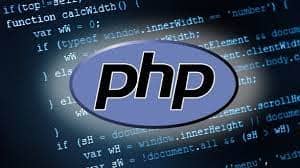PHP
PHP is a server-side scripting language that can be used for converting any website into a dynamic website and allow for dynamic behavioural functions in the website. PHP is a free open-source tool and is the preferred development option of most companies across the web. Benefits of PHP include being able to collect form data, generate dynamic page content, or send and receive cookies.
PHP Training Syllabus :
An Introduction to PHP
-
Lesson 1. History of PHP
-
Lesson 2. Versions and Differences between them
-
Lesson 3. Practicality
-
Lesson 4. Power
-
Lesson 5. Installation and configuring Apache and PHP
Default Syntax
-
Lesson 1. Styles of PHP Tags
-
Lesson 2. Comments in PHP
-
Lesson 3. Output functions in PHP
-
Lesson 4. Datatypes in PHP
-
Lesson 5. Configuration Settings
-
Lesson 6. Error Types
Variables in PHP
-
Lesson 1. Variable Declarations
-
Lesson 2. Variable Scope
-
Lesson 3. PHP’s Superglobal Variables
-
Lesson 4. Variable Variables
Constants in PHP
-
Lesson 1. Magic Constants
-
Lesson 2. Standard Pre-defined Constants
-
Lesson 3. Core Pre-defined Languages
-
Lesson 4. User-defined Constants
Control Structures
-
Lesson 1. Execution Control Statements
-
Lesson 2. Conditional Statements
-
Lesson 3. Looping Statements with Real-time Examples
Functions
-
Lesson 1. Creating Functions
-
Lesson 2. Passing Arguments by Value and Reference
-
Lesson 3. Recursive Functions
Arrays
-
Lesson 1. What is an Array?
-
Lesson 2. How to create an Array
-
Lesson 3. Traversing Arrays
-
Lesson 4. Array Functions
Include Functions
-
Lesson 1. Include, Include_once
-
Lesson 2. Require, Require_once
Regular Expressions
-
Lesson 1. Validating text boxes,emails,phone number,etc
-
Lesson 2. Creating custom regular expressions
Object-Oriented Programming in PHP
-
Lesson 1. Classes, Objects, Fields, Properties, _set(), Constants, Methods
-
Lesson 2. Encapsulation
-
Lesson 3. Inheritance and types
-
Lesson 4. Polymorphism
-
Lesson 5. Constructor and Destructor
-
Lesson 6. Static Class Members, Instance of Keyword, Helper Functions
-
Lesson 7. Object Cloning and Copy
-
Lesson 8. Reflections
PHP with MySQL
-
Lesson 1. What is MySQL
-
Lesson 2. Integration with MySQL
-
Lesson 3. MySQL functions
-
Lesson 4. Gmail Data Grid options
-
Lesson 5. SQL Injection
-
Lesson 6. Uploading and downloading images in Database
-
Lesson 7. Registration and Login forms with validations
-
Lesson 8. Pagging, Sorting,…..
Strings and Regular Expressions
-
Lesson 1. Declarations styles of String Variables
-
Lesson 2. Heredoc style
-
Lesson 3. String Functions
-
Lesson 4. Regular Expression Stntax(POSIX)
-
Lesson 5. PHP’s Regular Expression Functions(POSIX Extended)
Working with the Files and Operating System
-
Lesson 1. File Functions
-
Lesson 2. Open, Create and Delete files
-
Lesson 3. Create Directories and Manipulate them
-
Lesson 4. Information about Hard Disk
-
Lesson 5. Directory Functions
-
Lesson 6. Calculating File, Directory and Disk Sizes
Error and Exception Handling
-
Lesson 1. Error Logging
-
Lesson 2. Configuration Directives
-
Lesson 3. PHP’s Exception Class
-
Lesson 4. Throw New Exception
-
Lesson 5. Custom Exceptions
Date and Time Functions Authentication
-
Lesson 1. HTTP Authentication
-
Lesson 2. PHP Authentication
-
Lesson 3. Authentication Methodologies
Cookies
-
Lesson 1. Why Cookies
-
Lesson 2. Types of Cookies
-
Lesson 3. How to Create and Access Cookies
Sessions
-
Lesson 1. Session Variables
-
Lesson 2. Creating and Destroying a Session
-
Lesson 3. Retrieving and Setting the Session ID
-
Lesson 4. Encoding and Decoding Session Data
-
Lesson 5. Auto-Login
-
Lesson 6. Recently Viewed Document Index
Web Services
-
Lesson 1. Why Web Services
-
Lesson 2. RSS Syntax
-
Lesson 3. SOAP
-
Lesson 4. How to Access Web Services
XML Integration
-
Lesson 1. What is XML
-
Lesson 2. Create a XML file from PHP with Database records
-
Lesson 3. Reading Information from XML File
MySQL Concepts
-
Lesson 1. Introduction
-
Lesson 2. Storage Engines
-
Lesson 3. Functions
-
Lesson 4. Operators
-
Lesson 5. Constraints
-
Lesson 6. DDL commands
-
Lesson 7. DML commands
-
Lesson 8. DCL commands
-
Lesson 9. TCL commands
-
Lesson 10. Views
-
Lesson 10. Views
-
Lesson 11. Joins
-
Lesson 12. Cursors
-
Lesson 13. Indexing
-
Lesson 14. Stored Procedures
-
Lesson 15. Mysql with PHP Programming
Syllabus Updates : Since each new technologies of Web Development has new features, we keep adding upgrading our syllabus every 6-12 months to accommodate for advancement. Some topics can be omitted from syllabus without prior notice as they might be redundant or not relevant to the batch being trained. You can request any Web Topic.

